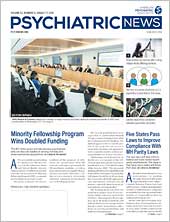By age 10, children with autism spectrum disorder (ASD) or autistic traits have more symptoms of depression than their peers, according to a study published June 13 in JAMA Psychiatry. Irrespective of genetic factors, the researchers found that depressive symptoms worsened up to the end of the study as the adolescents reached age 18 and were exacerbated by bullying.
“[F]urther research into the role of traumatic experiences, such as bullying, and the utility of interventions to reduce bullying or address its adverse effects could have the potential to reduce the burden of depression in this population,” wrote lead author Dheeraj Rai, Ph.D., a senior lecturer in psychiatry at the University of Bristol, and colleagues.
For the study, the authors relied on data from the Avon Longitudinal Study of Parents and Children. The Avon study collected data from 1990 to 1992 on more than 15,000 parents and children from pregnancy through childhood in the Bristol area from self-report questionnaires; clinical assessments; biological samples; and birth, medical, and educational records.
The final dataset for the study included 8,087 children. Five groups were identified as either having ASD or symptoms of ASD. Of this group, 96 were diagnosed with ASD, 546 had social communication impairments, 526 had problems with speech coherence, 419 displayed repetitive behaviors, and 801 had poor social temperament with overlap between the groups.
Participants with ASD and the four autistic traits had higher depression scores than the general population, as assessed by the Short Mood and Feelings Questionnaire (SMFQ) and the computerized version of the Clinical Interview-Revised, a psychiatric interview widely used in community samples. Their scores continued to rise over time. The SMFQ was administered at six points between ages 10 and 18 via mailed questionnaires or in clinics. Data analysis was conducted from January to November 2017.
At age 10, the children with ASD or autistic traits who reported being bullied had the highest average SMFQ scores; likewise, youth with social communication impairments who reported being bullied in childhood or adolescence were more likely to have a diagnosis of depression at age 18.
“It is possible that children with social communication problems, who may not have developed a good understanding of social rules and how to fit in, may be targets for bullies,” Rai told Psychiatric News. “Many of the autistic people I have worked with over the years have mentioned that the awareness of being excluded or targeted because of being perceived as different was particularly traumatic.”
“These findings add to the evidence highlighting a higher burden of depression and also suggest a potentially modifiable pathway, through bullying,” the authors wrote. “However, gaps remain in our understanding of the measurement and phenomenology of depression in individuals with autism, which could be a priority for future research. Further work could also focus on improvements in psychological and pharmacological management of depression in ASD.”
A systematic review of nearly 8,000 research articles in the March issue of the Journal of Abnormal Child Psychology reported that people with ASD are four times more likely to experience depression in their lifetime than people without ASD.
Rai noted that depression can be more difficult to detect in these patients because they may not recognize or be able to describe their mood states. For clinicians, Rai said the study shows that many young people and adults with depression have also had a history of trauma.
“[T]hese findings suggest that focusing on the role of traumatic experiences such as bullying and interventions targeting these could be important and may have the potential to make a real difference in the well-being of autistic people,” he said in a press release from the University of Bristol.
The study was funded by the Baily Thomas Charitable Fund. ■
“Association of Autistic Traits With Depression From Childhood to Age 18 Years” can be accessed
here. “Prevalence of Depressive Disorders in Individuals With Autism Spectrum Disorder: a Meta-Analysis” is available
here.
